The Drug Years
Producers: |
 photo: Easy Rider |
|||
| Break On Through Traces the birth of the counterculture, from the beboppers to the beatniks to the hippies. From the breakthrough, heroin-laced sounds of Charlie Parker, to the "bop prosody" of Jack Kerouac and Allen Ginsberg, to the "tune in, turn on, drop out" psychedelic mantra of Timothy Leary, and the communal "acid tests" of Ken Kesey and the Merry Pranksters. and finally to the explosion of creativity and social change in San Francisco's Haight Ashbury in the mid-'60s. Episode One illuminates how marijuana and LSD helped a new generation to open "the doors of perception," and how drugs became the tool for challenging mainstream, conservative American values. |  photo: Timothy Leary |
|||
 photo: Jimi Hendrix |
Feed Your Head The counterculture is co-opted by mainstream media and the psychedelic experience is bought and sold by Madison Avenue and Hollywood in films like The Trip and Easy Rider. The popularity of drugs is the establishment's worst nightmare. Shows like Dragnet feature drug storylines that reflect the system's fears about drug use. Meanwhile drugs are fueling a political upheaval and a violent backlash by the government. The utopian vision of the 1960s seems to crumble when a string of events - Altamont, the Manson murders, and the deaths of three rock and roll icons - Jim Morrison, Janis Joplin and Jimi Hendrix - make the dark side of drug use painfully clear. | |||
| Teenage Wasteland If the 1960s were about expanding the mind, the 1970šs, in the words of gonzo journalist Hunter S. Thompson, would be about getting "stoned, ripped, twisted." It was the golden age of pot - with swashbuckling smugglers, the popularity of High Times magazine, and a new era of drug humor exemplified by Cheech and Chong. By 1976, marijuana was on the brink of acceptance, with legalization advocates actually writing speeches for President Carter. Cocaine made its debut among the elite, and the Studio 54 era was ushered in. But the psychedelic prophets of the mid-OE60s never imagined what their legacy would become: high school kids getting stoned and going to the mall. With groups like "Nosy Parents Association" writing policy pamphlets and Reagan vying for the presidency, the tide started to turn, and the juggernaut that would become the drug war was set into motion. |  photo: Cheech & Chong |
|||
 photo: Pacino / Scarface |
Just Say No Traces America's growing drug use in the '80s and '90s: the loss of cocaine's "innocence", the media firestorm over crack and how the hip-hop community dealt with it; celebrity rehab and the growing recovery movement; ecstasy and rave culture, the ravages of rising methamphetamine use and America's ever escalating war on drugs. Finally, Episode 4 asks the hard questions: How did this happen? What have we learned? What should we do? What impact have drugs had on pop culture? On society? Is it even realistic to have a drug-free nation? | |||
| |
||||
| AWARDS:
Screenings - Full Frame Film Festival |
"...exists
at a whole other level"
|
|||
|
||||

